Theorists who believe the Moon landing was staged point to uneven shadows, the lack of stars in photos, and the famous picture of a waving flag as proof.
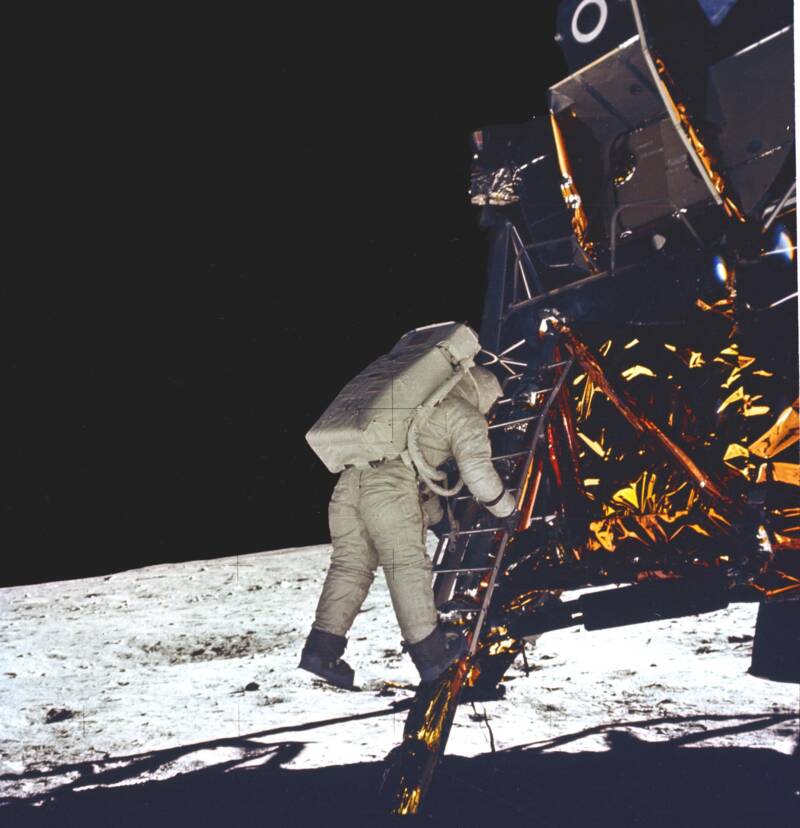
NASAIn 1969, astronauts Neil Armstrong and Buzz Aldrin become the first people to set foot on the Moon — or was it just a sound stage?
“That’s one small step for man, one giant leap for mankind,” astronaut Neil Armstrong said on July 20, 1969, the day humanity first landed on the Moon. Or did we? It was the middle of the Cold War, and the Russians had already sent Sputnik into orbit. America needed a win, and landing on the Moon was the perfect way to one-up the communists. Too perfect, some might say. This raises the question: Was the Moon landing fake?
As ridiculous as it may sound, the idea that NASA faked the Moon landing — possibly with the help of famous director Stanley Kubrick — is one of history’s most popular conspiracy theories. Still, for a time, the idea of a fake Moon landing was widely proliferated. What’s more, unlike many of today’s more outlandish theories, there was at least some reason to believe it may have been true.
Unlike the Flat Earth conspiracy theory, for example, NASA very well could have had a reason to lie about landing on the Moon. The U.S. and the U.S.S.R. were at the height of the so-called “Space Race,” each competing to be the first country to put mankind on the Moon. Sputnik sent American engineers into a panic spiral; the Russians were closing in on their goal.
NASA was determined to beat Russia to the Moon, no matter the cost. But what if they simply couldn’t? If only there were some way to make it look like NASA astronauts had landed on the Moon. It would take a highly skilled filmmaker to do it — but it could be done.
Of course, most people agree that NASA really did put three astronauts on the Moon in the summer of 1969. For every piece of “evidence” that the Moon landing was fake, there are hundreds of pieces of evidence that prove the opposite. Yet, the idea lingers on more than 50 years later — and it’s easy to see why.
The Origin Of The Fake Moon Landing Conspiracy Theory
It all began in the mid-1970s when the initial excitement about the Apollo 11 Moon landing had started to die down. Then, rumors that perhaps America hadn’t actually gone to the Moon at all began to circulate. NASA, some people said, was lying to everyone just to get a leg up on the Russians.
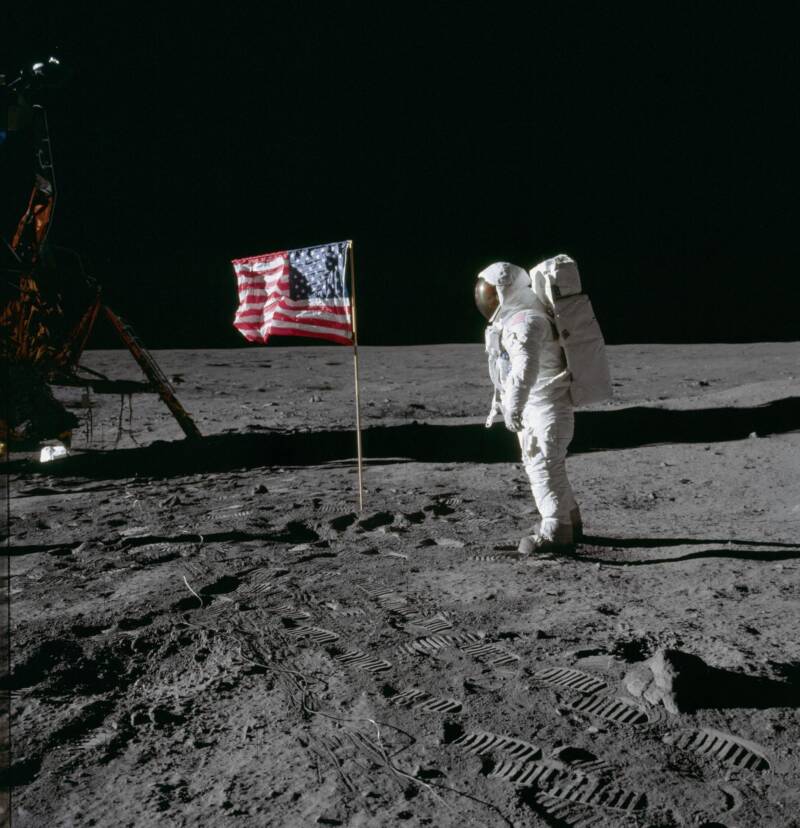
NASABuzz Aldrin standing next to the American flag on the Moon. Conspiracists say wind must be blowing the flag — but it’s actually supported by a horizontal pole to make it appear as if it’s waving.
However, the theory really started to take off in 1976, when a former U.S. Navy officer named Bill Kaysing self-published a pamphlet titled We Never Went to the Moon: America’s Thirty Billion Dollar Swindle. Kaysing, who had earned a degree in English and had no knowledge of rocket science, served as a technical writer for Rocketdyne from 1956 to 1963. Rocketdyne was the company that built the engines for the Saturn V rocket that propelled the first astronauts to the Moon.

Bill Kaysing/billkaysing.comBill Kaysing, the former Navy officer known for spreading conspiracy theories about the Moon landing.
Kaysing effectively argued that the odds of successfully landing on the Moon were so low that it would have been easier to fake the Moon landing on a sound stage, even if Russian spies were about. Whether Kaysing’s evidence was credible didn’t really matter — the pamphlet shot him to national fame, and he made countless appearances on radio and television to discuss his claims. He was dubbed “The Father of the Moon Hoax Theory” and later claimed that he used the theory to encourage people to question authority.
Kaysing likely didn’t realize just how influential his claims would be. But four years after he published his pamphlet, another group of conspiracy theorists would take the concept and run with it: the Flat Earth Society.
How The Flat Earth Society Helped Spread The Lunar Conspiracy Theory
“The facts are simple. The Earth is flat,” said Charles K. Johnson, president of the International Flat Earth Research Society, in a 1980 interview with Science Digest.
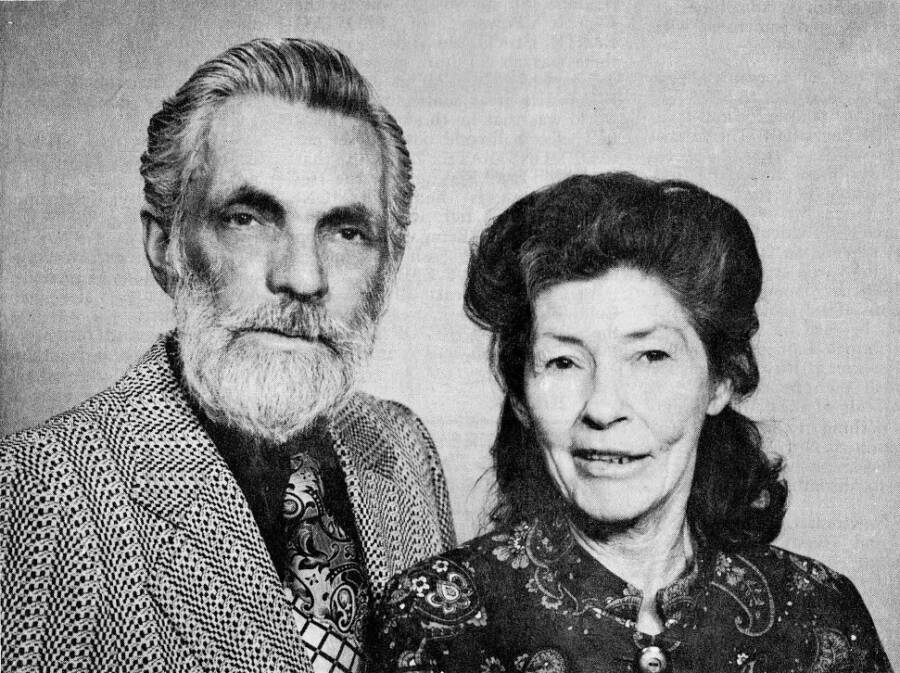
The Flat Earth News, September 1979Charles K. Johnson and his wife, Marjory, who ran the Flat Earth Society from their home in California.
Johnson, who ran the Flat Earth Society from his California home, was devoutly religious. He believed that science — and in particular, space exploration — was an attempt to remove Jesus from the world and hide the biblical truth that the Earth was, in fact, flat. A major part of Johnson’s beliefs derived from the fact that, in the Bible, Jesus ascended up into Heaven.
“The whole point of the Copernican theory is to get rid of Jesus by saying there is no up and no down,” Johnson claimed. “The spinning ball thing just makes the whole Bible a big joke… Reasonable, intelligent people have always recognized that the Earth is flat.”
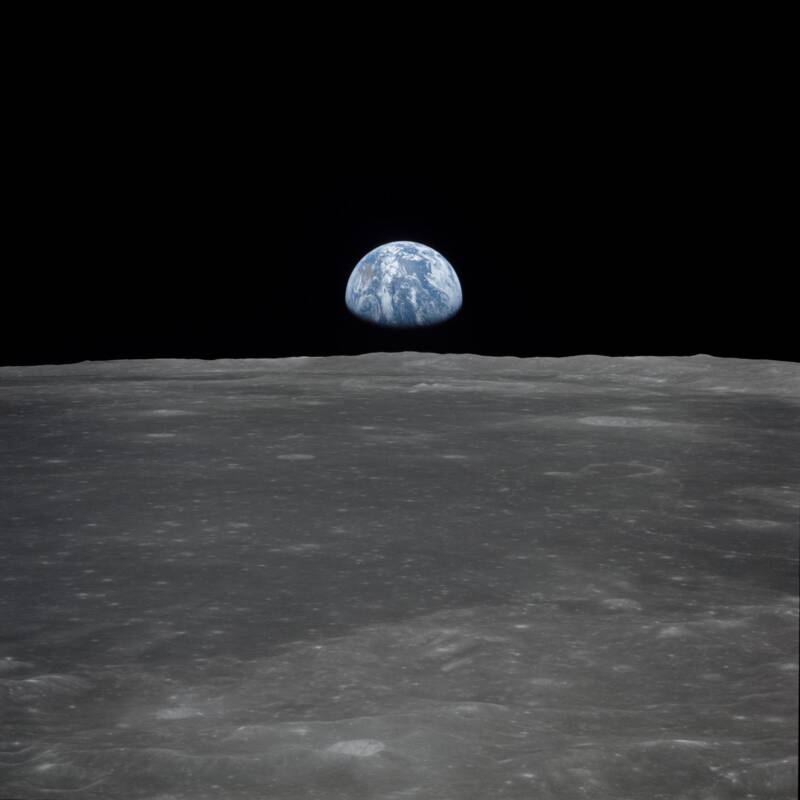
NASAA clearly round Earth as seen from the Moon in July 1969.
Johnson made several other sensational claims, such as “Moses was a Flat-Earther,” “Columbus was a Flat-Earther,” and the Church of England taught us “the world is a ball.”
Until the fake lunar landing and the photos of Earth that were released from the supposed surface of the Moon, Johnson said, “almost no one considered the world a ball. The landings converted a few of them, but many are coming back now and getting off of it.”
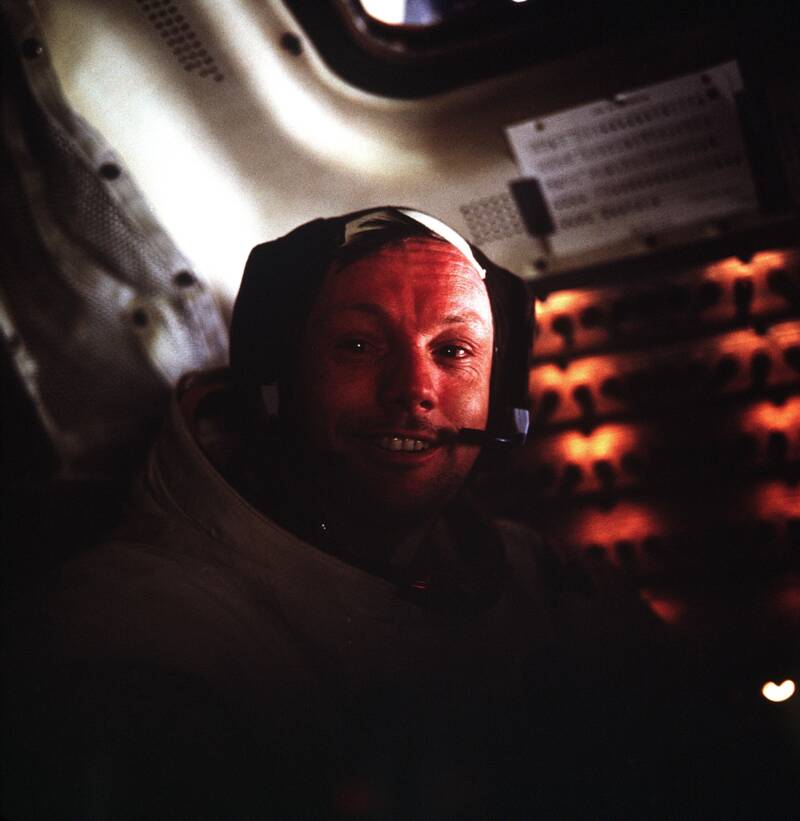
NASAAstronaut Neil Armstrong during the Apollo 11 mission.
The Flat Earth conspiracy theory is still alive and well today, with believers all around the globe. Along with this, the idea that NASA faked the Moon landing has continued to spread. They are, at this point, inseparable. Believers in the theory that the lunar landing was a hoax claim to have evidence, though, so it is only fair to examine it.
Debunking The ‘Evidence’ That The Moon Landing Was Fake
As Kaysing made a point of highlighting, going to the Moon was no easy task. President John F. Kennedy said it himself in a 1962 speech: “We choose to go to the Moon in this decade and do the other things, not because they are easy, but because they are hard.”
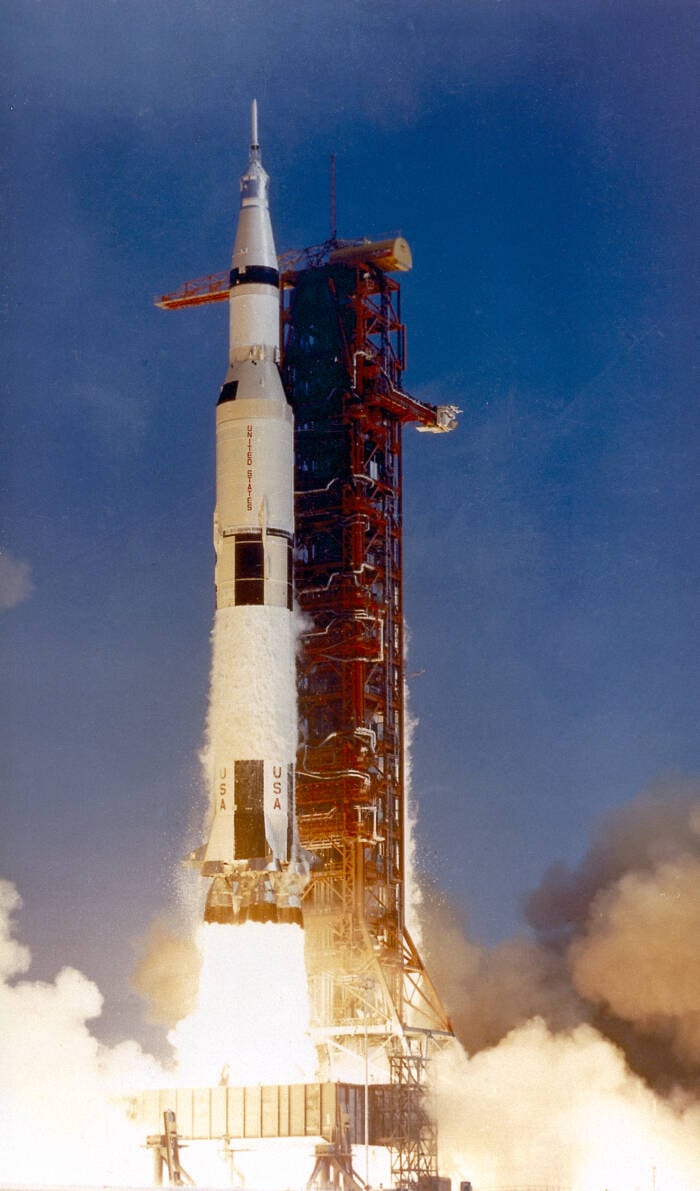
NASAThe launch of the Saturn V rocket. July 16, 1969.
Landing on the Moon was a challenging endeavor, but it wasn’t so difficult that NASA would forego the project altogether. It was certainly not so challenging that the agency would enlist Stanley Kubrick and Arthur C. Clarke, who had worked together previously on the 1968 film 2001: A Space Odyssey, to fabricate it. The Russians would surely have been able to suss out that the footage was fake. That’s not to mention the heaps of other evidence, including Moon rocks, laser imaging, and actual photographs showing that the lunar landing really happened.
Still, even today, around five percent of Americans believe the Moon landing was fake. That may sound like a small number, but it’s more than 16 million people. And, like with any die-hard conspiracist, it’s nearly impossible to convince them otherwise. That hasn’t stopped scientists from trying, however.
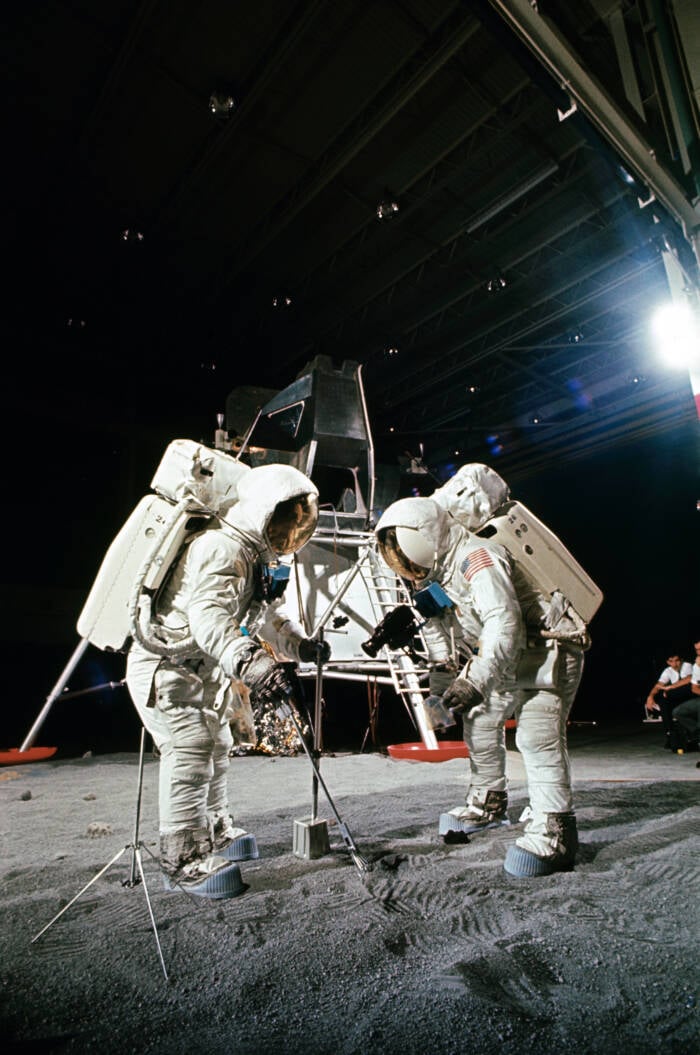
NASAAstronauts Neil Armstrong and Buzz Aldrin at a testing facility practicing their Moon walks pre-launch.
In 2019, the former chief historian for NASA, Roger Launius, spoke at length with the Associated Press to try and debunk some claims made by conspiracists.
For example, theorists have claimed that, in photos from the Moon landing, the American flag seems to be blowing in the wind. In actuality, a pole along the top of the flag holds it out to make it appear as if it’s waving. Armstrong and Aldrin accidentally bent the rod a bit, causing the ripple seen in the image.
Proponents of the conspiracy theory also point to the fact that there are no stars in the sky in any of the images from the lunar landing. It was daytime on the Moon when Armstrong and Aldrin took the photos. The stars did not show up because of the camera’s shutter speeds, which were too fast to capture their faint light during the day — not because the astronauts were on a sound stage.
Another main point of contention for conspiracists is how, exactly, the photos were taken, as neither Armstrong nor Aldrin ever appears to be holding a camera. The answer? The cameras were mounted on their chests.
After all, it would have been difficult to hold a camera up to their eyes in their suits.
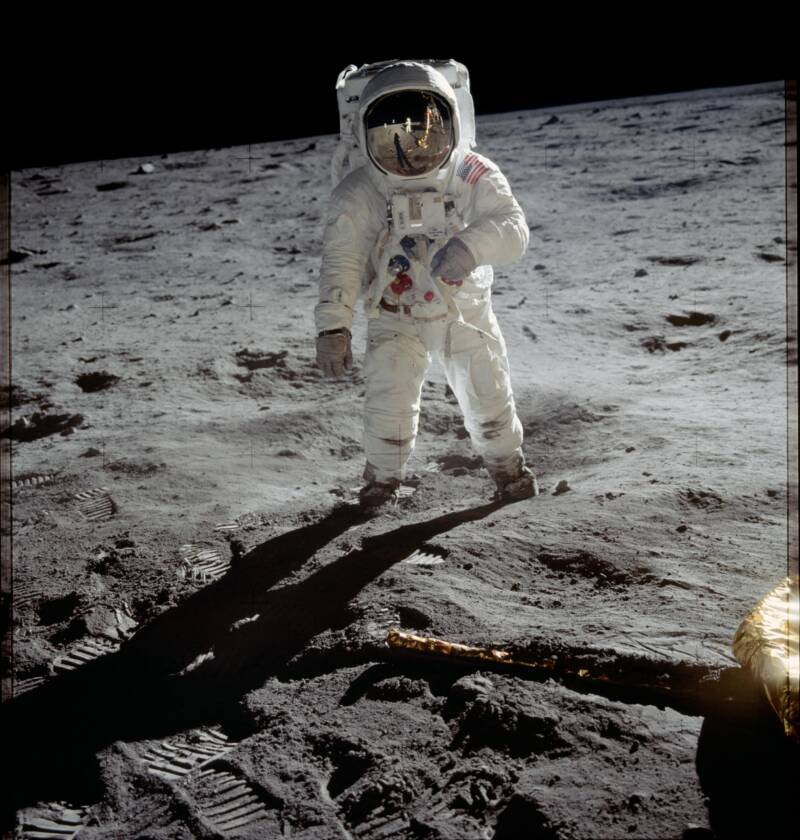
NASABuzz Aldrin on the Moon.
It’s easy to look back at the Moon landing, say that such a seemingly impossible task couldn’t have been accomplished, and cast enough doubt to convince the easily swayed, distrustful, and paranoid that someone has been lying to them. What conspiracists fail to recognize, though, is that the people pushing these theories have an agenda of their own, too.
After reading about the theory that the Moon landing was fake, go inside Project Blue Beam, the theory that NASA and the United Nations are trying to create a New World Order. Then, learn how Margaret Hamilton helped NASA land astronauts on the Moon in 1969.





